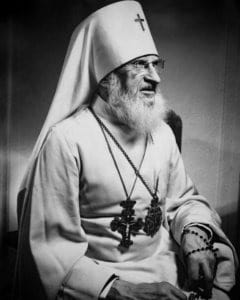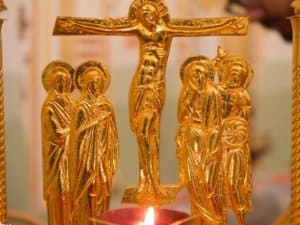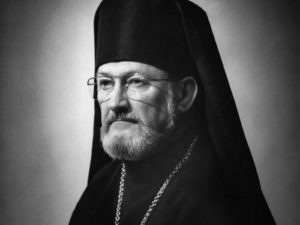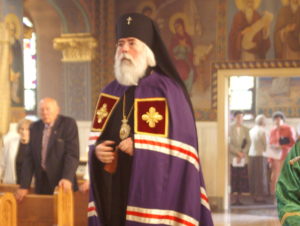 Father Leonid’s bright intellect and strong ecclesiastical erudition, molded by his upbringing in a priestly family and schooling at the Kyiv Theological Academy, quickly brought him to the forefront of North American clergy. As one of Saint Tikhon’s closest advisors, he was elected chairman of the First All-American Sobor (Council), held in Mayfield, PA in 1907. At this and subsequent councils, his leadership guided the continuing formulation of the Church’s ongoing missionary vision in North America.
Father Leonid’s bright intellect and strong ecclesiastical erudition, molded by his upbringing in a priestly family and schooling at the Kyiv Theological Academy, quickly brought him to the forefront of North American clergy. As one of Saint Tikhon’s closest advisors, he was elected chairman of the First All-American Sobor (Council), held in Mayfield, PA in 1907. At this and subsequent councils, his leadership guided the continuing formulation of the Church’s ongoing missionary vision in North America.
When the seminary was relocated to Tenafly, NJ in 1912, Father Leonid moved east, continuing his work at the seminary and eventually succeeding Saint Alexander Hotovitzky as dean of New York City’s Saint Nicholas Cathedral and editor of the American Orthodox Messenger, the Church’s official periodical.
Father Leonid was one of two priests selected to join Archbishop Evdokim in representing the North American Diocese at the All-Russian Church Council in Moscow in 1917-1918, at which he championed the restoration of the patriarchal system of Church governance abolished by Tsar Peter the Great two centuries earlier.
After the council, Father Leonid returned to America via Siberia, witnessing along the way the horrors the newly-established Bolshevik regime was inflicting on the Church and her faithful. Back in America, Father Leonid’s experiences at the Moscow Council clearly filled him with a vision and model for subsequent All-American Sobors and Church life.
When Father Leonid was widowed in 1925, elevation to the episcopacy was proposed to him almost immediately. Initially, he rejected this out of concern for the continued upbringing of his five children. But in 1933, he accepted monastic tonsure with the name Leonty, and was consecrated Bishop of Chicago. While he had been a hierarch for scarcely more than one year when the Fifth All-American Sobor was convened in November 1934 to elect a
successor to the late Metropolitan Platon, many considered Bishop Leonty as the most viable candidate. However, when the sobor’s delegates debated the proper procedure for electing a Primate, Bishop Leonty suggested that they simply acknowledge the senior hierarch, Archbishop Theophilus, as Primate. To this suggestion, the delegates responded with a resounding cry of “Axios,” electing Archbishop Theophilus.
Until 1950, Bishop Leonty continued shepherding his Midwest flock, while serving as Metropolitan Theophilus’ foremost assistant in guiding the Church through World War II, a decade-long period of ecclesiastical synergy and peace with ROCOR, the reopening of theological seminaries in America, and a failed attempt of ending estrangement from the Church in Russia.
By the time Metropolitan Theophilus died in 1950, the clergy and faithful knew that only Archbishop Leonty could be the next Metropolitan of All America and Canada. Indeed, at the Eighth All-American Sobor in December 1950,
he was elected Primate by a nearly unanimous vote. During his tenure, structure was given to the Church through the adoption of a governing Statute in 1955. With his blessing, the first English-language parishes were established; various pan-Orthodox initiatives, including the Standing Conference of Canonical Orthodox Bishops in the Americas and the Orthodox Christian Education Commission, were undertaken; and preliminary steps were taken to the heal the rift with the Russian Church, ultimately paving the way to autocephaly for the Orthodox Church in America.
After 15 years of service as Primate, Metropolitan Leonty peacefully fell asleep in the Lord at his residence in Syosset, NY, on May 14, 1965, and was interred at Saint Tikhon’s Monastery, South Canaan, PA. Those who were blessed to have known Metropolitan Leonty cherish his humility, prayerfulness, meekness, dignity, kindness, generosity, forbearance, thoughtfulness, sense of humor, vision, erudition and wisdom.
This biography was written by OCA archivist Alexis Liberovsky and originally appeared in the The Orthodox Church magazine, Vol. 2, No. 7/8, July/August 2006.
The text of the booklet, titled “Essays of Orthodox Theology” may be found here.
May the memory of Metropolitan Leonty be eternal!



